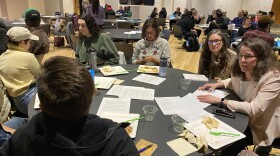Due to the COVID-19 outbreak, the University of Oregon is making adjustments to prepare for financial hardships. On Thursday, the UO held a virtual town hall for employees to address concerns about funding.
During the town hall, UO President Michael Schill said he will be taking a temporary pay cut of 12%. UO vice presidents and the athletic director have also been asked to take a 10% salary reduction. Schill said these deductions will be in place for at least six months, but could be extended to the end of the 2020-2021 school year.
Schill said he and other administrators are working to preserve as many jobs and benefits as possible. But there was one promise he couldn’t keep—whether or not staff will receive pay cuts or layoffs.
“At the same time, the university does not have the resources to put off some very difficult decisions—which will entail some level of hardship,” said Schill. “While it is too early today to say with any certainty, we expect the COVID-19 crisis and the current recession will generate significant financial challenges to our university.”
Now, the UO is preparing to assess how much funding they will lose from major sources—students and the state budget.
Schill said the decrease of students in residence halls, and those who utilize dining services, will untimely impact funding. Schill said they normally house and feed over 4,500 students. Now, there’s fewer than 300 students living in campus dorms.
Currently, the UO does not know what student enrollment will look like next year, because the new student application period is still open.
“A significant dip in enrollment would create real financial challenges for this university,” said Schill. “We are working hard to make sure that doesn't happen. But it is really hard to predict due to uncertainty created by COVID-19. We will—almost a very high level of certainty—get a cut in our state support as the state goes into recession.”
Schill said they might not be able to determine which faculty will remain employed until as late as October. But they hope to have a good idea of faculty retention in the next few months.
The UO has also enacted a hiring freeze. Schill said this would allow them to conserve revenue and employ as many existing staff for as long as possible. Schill also said they are working to alleviate financial hardship if layoffs do occur.
Asked Schill, “If we're unable to preserve jobs, how can we alleviate the hardship of that? How can we make sure that our community is held together? How can we make sure that people are taken care of?”
During the last economic downturn, UO Provost Patrick Phillips said the state cut $36 million from the UO’s budget.
“Just for a benchmark that's about the size of the budget of the Lundquist College of Business,” said Phillips.
Phillips said their previous response to a reduction in state funding was to raise tuition and increase enrollment. But the university has already raised tuition “up to the market values” when the university approved the Oregon Guarantee last month.
A popular question that has been asked is whether or not the university can transfer funds from the athletic department. But Schill said that is not possible—because like other departments—they are also seeing a funding reduction.
“Next to housing and food, athletics is the most financially impacted part of the university right now,” said Schill. “With the cancellation of the NCAA March madness, the distribution from the NCAA to universities has been cut tremendously, which is opening up a big hole in [the] athletics budget.”
Since sports seasons have been cancelled, ticket sales are also down. Altogether, Schill said the athletics department is already heading into negative territory.
Schill said the UO is working to update employees as conditions progress.









